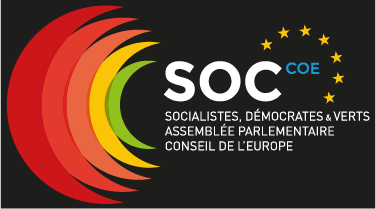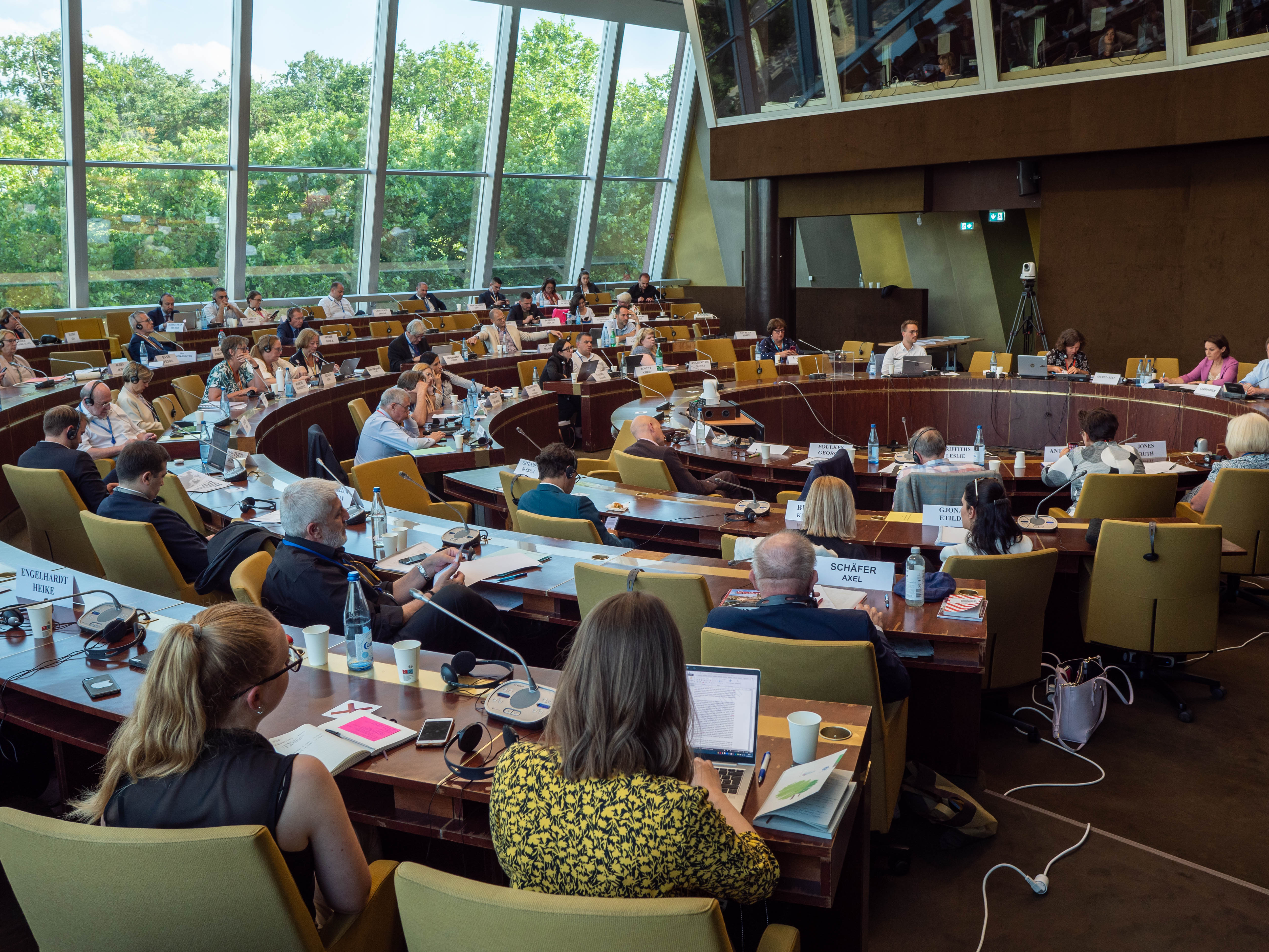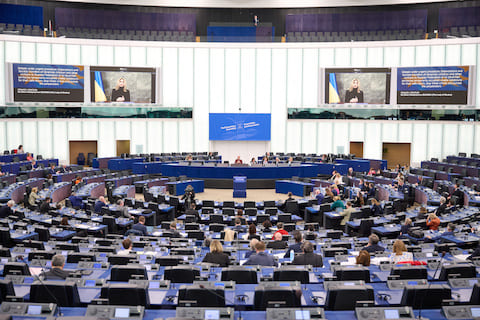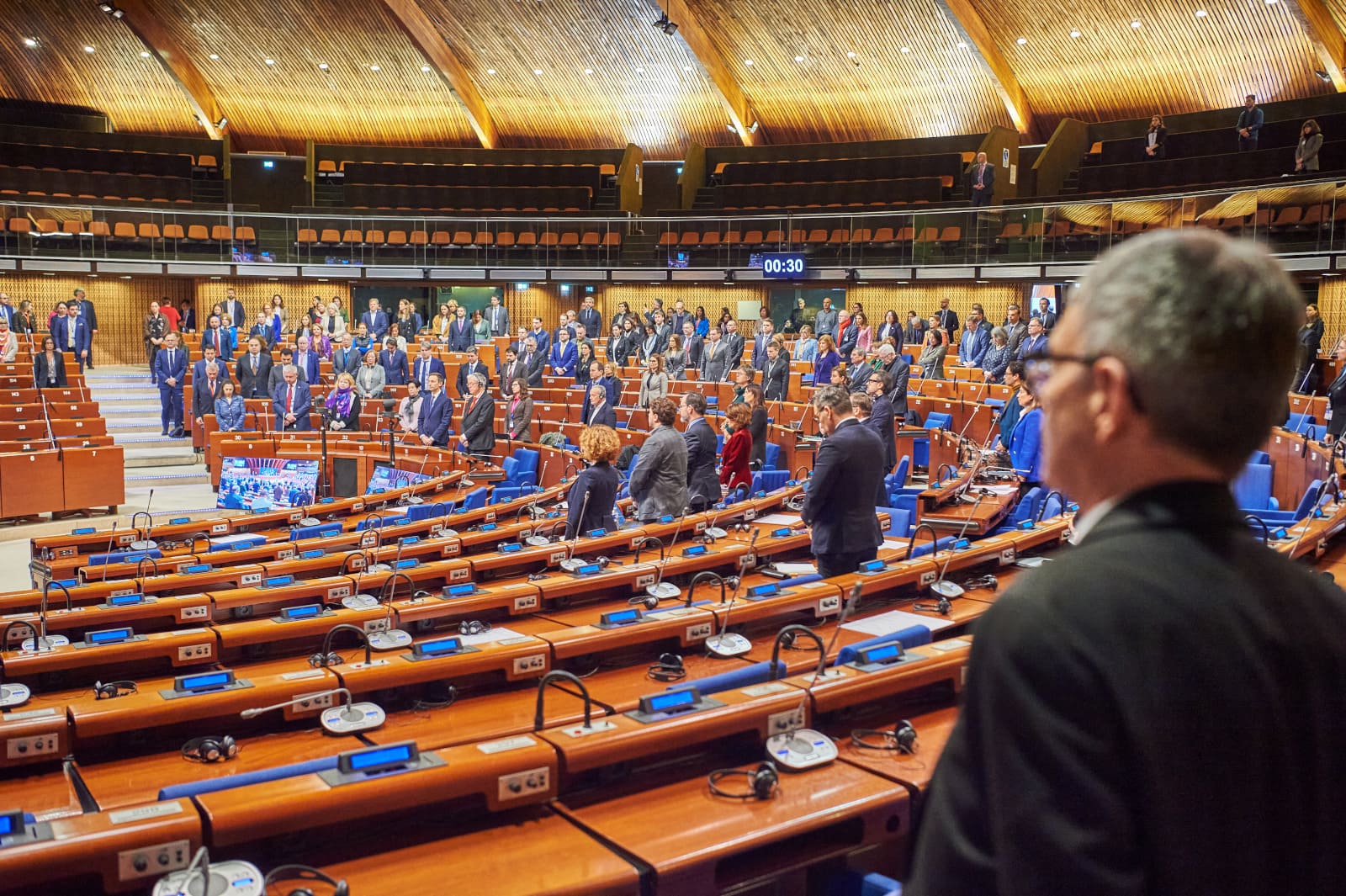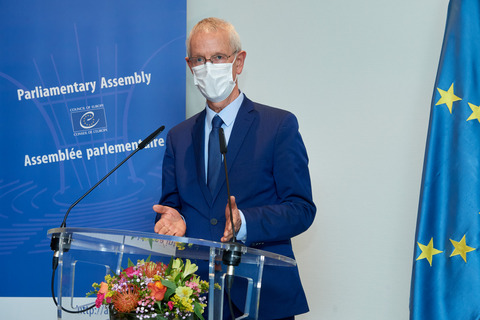
The part session of January 2022 was marked by the election of a new President of the Assembly, new Chairs and Vice-Chairs of Committees, the adoption of several reports and the Commemoration event in memory of the victims of the Holocaust.
The January 2022 Part-session of the Assembly opened with the election of its new President. Tiny Cox (UEL, Netherlands) was elected by a clear majority against his opponent Mariia Mezentseva (EPP, Ukraine). The SOC Group supported the election of Tiny Cox and congratulated him warmly for his election as President.
For the election of the Vice President for the Russian Federation, there was a contestation of Petr Tolstoi’s candidature. As he did not reach the relative majority, M. Tolstoi was not elected Vice President of PACE. Hence, the Russian delegation must now present a new candidate.
The credentials of the Russian delegation were challenged, both on substantive and procedural grounds. The Monitoring Committee was requested to draft a report and nominated his newly elected Chair, Piero Fassino (SOC, Italy) rapporteur. The adopted report proposed to ratify the credentials. While it stressed the deterioration of the situation of human rights and fundamental freedoms in Russia, it underlined the need of political dialogue in the unique pan European parliamentary platform, the Parliamentary Assembly. The report was adopted by a large majority.
Election of Chairs and Vice-Chairs of Committees:
During its January Part-session, the PACE reconstitutes its committees and elects their respective Chairs and Vice-Chairs. These positions are shared among the five Political Groups, respecting the distribution of seats based on the size of each group on the date of 30th June of the previous year. They are the result of negotiation based on a political agreement among Political Groups. According to the data of 30 June 2021, the SOC Group was the largest one and entitled to 3 Chairmanships of Committees and 8 Vice-Chairmanships. This year too, the SOC Group gave one Vice-Chairmanship to the United European Left.
These are the positions held by SOC members:
Chairmanships:
Monitoring Committee: Piero Fassino
Committee on Social Affairs: Selin Sayek Böke
Committee on Election of Judges: Titus Corlatean
Vice Chairmanships:
Political Affairs Committee: Kimmo Kiljunen, 1st Vice-Chair
Legal Affairs Committee: Margreet De Boer, 2nd Vice-Chair
Social Affairs Committee: Sibel Arslan, 3rd Vice-Chair
Committee on Migration: Domagoj Hajdukovic, 2nd Vice-Chair
Committee on Culture: Stefan Schennach, 1st Vice-Chair
Committee on Equality: Fourat Ben Chihka, 3rd Vice-Chair
Committee on Rules: Yuliya Lovochkina, 2nd Vice-Chair
Joint debate
The right to be heard: child participation by Doreen Massey (UK, SOC)
And
Inaction on climate change – a violation of children’s rights by Jennifer De Temmerman (FR, ALDE)
The Assembly held a joint debate based on two reports covering closely interlinked issues: Child participation as a foundation for democratic societies (Doreen Massey) and the Inaction on climate change as a violation of children’s rights (Jennifer De Temmerman). The reports respectively called on the Assembly to commit to consult children in the preparation of reports that concern them at all stages of the process, and to support children’s participation in democratic debates on climate change at all levels of governance.
The reports were built on good practices from member states and international organizations and called for enhanced child participation to build capacity, confidence, and identification with public institutions. While including children in decision-making processes is in our best interest as a society, the Assembly agreed that this is particularly true as children are “experts by experience” on several issues and hold the highest stakes in their future when it comes to the climate crisis. As such, both resolutions were warmly adopted by the Assembly.
The SOC group recognised the importance of creating more spaces for children’s participation in the public life and ensure that their voices are heard, especially when issues concern them directly as in the case of climate change. As such, the SOC Group wholeheartedly welcomed the adoption of both reports and called for immediate action to support children’s participation in the decision-making process at all levels of governance.
Joint debate
Combating rising hate against LGBTI people in Europe, by Fourat Ben Chikha (Belgium, SOC)
And
Alleged violations of rights of LGBTI people in the Southern Caucasus by Christophe Lacroix (Belgium, SOC)
Concerned by the increase of hate speech and hate crime targeting LGBTI people on the European continent, the Assembly held a joint debate on the way to combat rising hate against LGBTI people and the state of play concerning the respect of their rights in the Southern Caucasus. The members of the Assembly heard a statement by Commissioner Dalli on the EU policy and particularly the LGBTIQ equality strategy adopted in 2020 and the importance of the cooperation of the Council of Europe and the EU in this field.
Fourat Ben Chikha stressed the danger of the rise of LGBTI phobia in Europe with increase in hate speech, violence and hate crime, and urged the Member states to tackle hatred and discrimination against LGBTI people. The Assembly discussed particularly the situation in this regard in Hungary and Poland, welcoming the opinion of the Venice Commission on the Hungarian legislation.
The Assembly called on all the members States to put in place a clear human rights policy to protect and promote LGBTI equality. As the rapporteur said during the debate: “no one should need to hide its identity”. The resolution and the recommendation received an overwhelming support. Christophe Lacroix focused his report on the situation in three members States which share a common recent history: Armenia, Azerbaijan, and Georgia. He recalled that it is the responsibility of all member states to ensure human rights and fundamental freedom, including the rights of LGBTI people.
During the debate, it was stressed that a country’s cultural and religious traditions cannot be used to justify discrimination based on sexual orientation, gender identity, gender expression, and sexual characteristics. The Assembly stressed its concerns about the situation of LGBTI people in the three countries. Nevertheless, the members welcomed the progress made by Georgia in combating discrimination through the adoption of legislation. They considered that the democratic transition process in Armenia can be an opportunity to strengthen the human rights protection and combat discrimination.
The Assembly engaged the authorities of the three countries to combat discrimination against LGBTI people.
The resolution received great support during the debate and was overwhelming adopted.
Football governance: Business and values by Lord George Foulkes (SOC, United Kingdom)
The Assembly held a debate on the important role the football industry plays concerning the Council of Europe’s core values and human rights standards. The debate was complemented by a statement from FIFA President Mr Giovanni Infantino, who directly contributed to the report by providing the Federation’s support and expertise. As Mr Infantino recalled, FIFA signed a memorandum of understanding with the Council of Europe in 2018, and since then has been working together trying to help improve football and the governance of football.
The report stressed the important role football plays in the lives of many people and pointed out several issues which negatively impact people’s attitudes and values globally, including human rights, anti-corruption, anti-discrimination, and equality. It pointed the necessity to reform the transfer system, the regulation of agents, and the setting up of a clearinghouse for all financial transactions to ensure greater transparency of financial dealings.
Moreover, the report included proposals to give fans a greater role in football governance at all levels. With regards to human rights, the report stressed the need to ensure the protection of underage players, foster gender equality, and keep the pressure on working conditions in Qatar in the run-up of the World Cup.
The SOC group welcomed the adoption of the resolution, pointing the necessity for football to convey values such as the rights of workers and underage players and calling for further co operation and dialogue between FIFA, UEFA and the Council of Europe.
The report was adopted by a huge majority.
Poisoning of Alexei Navalny by Jacques Maire (ALDE, France)
The report is built on the medical evidence showing that Mr Navalny was poisoned on 20 August 2020. The report proposed to call on the Russian Federation to launch an independent and effective investigation into the poisoning of Alexei Navalny, further to its obligations under the European Convention on Human Rights; to investigate the alleged use of a chemical weapon on Russian territory in accordance with the Chemical Weapons Convention; and to reach agreement on a technical assistance visit by the Organisation for the Prohibition of Chemical Weapons.
The Assembly recalled that several separate tests have established that Mr Navalny was poisoned with a substance related to a group of chemicals generally referred to as “Novichok” and expressed serious concerns over Russian authorities’ failure to co-operate with the rapporteur on the matter.
The SOC group stressed its regret at the failure to cooperate with the Russian authorities, and recalled several cases brought before the European Court of Human Rights by Mr Navalny himself, in which the Court had found several violations by the Russian authorities, namely freedom of expression, right to liberty and security, right to fair trial, prohibition on punishment without law, and prohibition on inhuman and degrading treatment and punishment.
The report was adopted by an overwhelming majority.
Debate under urgent procedure
Beating Covid-19 with public health measures
The Assembly held a debate under urgent procedure to discuss the necessity of a paradigm shift in governments and parliaments in Council of Europe Member States to implement public health measures in a human-rights compliant way to beat COVID-19 and prepare for future global threats such as the climate crisis.
As argued by the report drafted by Stefan Schennach (Austria, SOC), global initiatives promoting solidarity in the fight against the pandemic are showing their results and should receive the praise they deserve. However, they cannot compensate for the lack of public health measures as shown by the many consequences of the pandemic: lack of an equitable global vaccine rollout, persistence of long-COVID symptoms in many patients, a worrying mental health crisis due to the chronic stress and uncertainty of the pandemic.
On the topic of vaccines, the SOC Group also stressed the importance of rebuilding trust in the public institutions as a necessary step to defeat vaccine hesitancy.
The resolution was adopted by a large majority.
Event on the occasion of the International Day of Commemoration in memory of the victims of the Holocaust
The Assembly held an event in occasion of the International Day of Commemoration in memory of the victims of the Holocaust. The event was opened by a commemoration of Simone Veil, who spoke in 2002 to underline the importance of transmitting the memory of the Holocaust as a generation of survivors passes away.
Simone Veil’s appeal to preserve the memory of the Holocaust through its direct accounts was echoed by the testimony of Ms Eva Clarke (Holocaust Educational Trust), who gave an account of her early life as a survivor.
The Assembly then listened to French President Emmanuel Macron, and French Minister of National Education, Jean-Michel Blanquer, who stressed the importance of education at all levels to preserve the values that stand at the foundation of European democracies.
The role of education as a pivotal aspect of the remembrance of the Holocaust was also at the heart of the intervention by Mr George Mayer, President of the Association “Families and Friends of the Deportees of Convoy 77”, which engages teenagers from all over Europe in research and sensibilization projects and has contributed to the analysis of tens of biographies of French deportees during the war.
Secretary General of the Council of Europe Ms Marija Pejcinovic Buric commended the projects advanced by the French government and called on all education systems to contribute in similar ways.
Italian Minister of Education, Patrizio Bianchi referred to education as the means to connect the relevance of this day to the very idea of European integration.
Italian Senator for life and Shoah survivor Ms Liliana Segre praised the Assembly’s decision to commemorate Simone Veil. She concluded with a warning against incredulity and indifference in the face of these terrible events today as well as 70 years ago.
The SOC group recalled the importance to keep the memory of the Holocaust alive through the testimonies of its survivors, as too often we tend to speak of past and present historical events without considering the individual stories that constitute those events.
Frank Schwabe representing the SOC Group intervened in the Ceremony.
New elections within the Group of Socialists, Democrats and Greens
As each year, the SOC Group elects its Vice Presidents who compose the Bureau of the Group. The procedure respects the rotation of the countries, based on the number of SOC members in each national delegation.
For 2022 the composition of the Bureau is as follows:
Chair: Frank SCHWABE
1st Vice Chair: Selin SAYEK BÖKE
VICE-PRESIDENTS:
Spain: Antonio GUTIERREZ LIMONES
United Kingdom: Sir Tony LLOYD
Romania: Titus CORLATEAN
Albania: Klotilda BUSHKA
Denmark: Mogens JENSEN
Malta: Jonathan ATTARD
Switzerland: Ada MARRA
Andorra: Pere LOPEZ
Latvia: Boris CILEVICS
Montenegro: Milos KONATAR
San Marino: Gerardo GIOVAGNOLI
Slovenia: Meira HOT
Ukraine: Yuliya LOVOCHKINA
Auditors:
Sunna AEVARSDOTTIR
George PAPANDREOU
Treasurer:
Pierre-Alain FRIDEZ
President Women’s Group:
Azadeh ROJHAN GUSTAFSSON
At the same time, the Group appointed its Committee’s Coordinators. Their role is to bring efficiency in communication among the SOC members of each Committee, to coordinate the work, and to ensure a strong participation in the works of each Committee.
The list with the SOC Coordinators for 2022 :
Political Affairs Committee : Ünal ÇEVIKÖZ
Legal Affairs Committee : Sunna AEVARSDOTTIR
Monitoring Committee: Stefan SCHENNACH
Social Affairs Committee : Carina OHLSSON
Equality Committee : Petra BAYR
Committee on Culture : Lord George FOULKES
Migration Committee : Domagoj HADJUKOVIC
Rules Committee : Yulya LOVOCHKINA
Election of Judges Committee: Boriss CILEVICS

